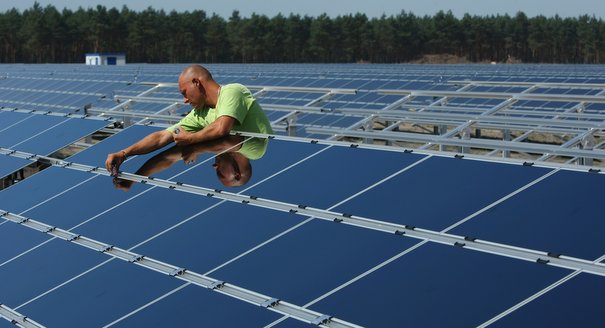Without energy security, there is no security in Europe. Behind today’s economic headlines an important energy debate is going on. All tasks have one goal: to make Europe more secure, sustainable, and competitive in energy.
Secure energy has enabled Europe to develop in peace and stability. Energy crises have an untold impact on societies, economies, and governments—as the oil embargo of 1973 and events at the Fukushima nuclear reactor in March 2011 demonstrate. A strong European energy policy is the only way to reduce risks to energy security and make Europe more resilient to potential fallout from global events.
European Commission President José Manuel Barroso has called energy policy “the next great European integration project.” The European Council echoed this view at the Energy Summit of February 2011.
The European Union can develop a common European energy policy for a more secure future.
For two generations, Europe has resisted the force which brought it together in the first place: a common energy policy. But global, geopolitical, and population changes are forcing countries to rethink their approach to energy.
The EU has identified the tools it needs to assert and defend its energy interests:
- A resilient, secure, and politically assertive European energy market;
- A diverse and sustainable supply base promoting low-carbon technologies and energy efficiency;
- Emergency response mechanisms and solidarity; and
- A common external policy.
We now have to develop and implement them fully.
The EU’s Europe 2020 and the Energy 2020 Strategies adopted in 2010 are a good start. They commit Europe to building a more secure, sustainable, and competitive energy system based on freely flowing energy across Europe, with more low-emission, locally produced, renewable, and efficient energy. The 20-20-201 energy and climate agenda gives clear direction for 2020. Beyond this point, the Commission’s 2050 Roadmap sets out the need to further intensify these efforts. Together, within a global effort that includes other developed countries, the EU can reduce greenhouse gas emissions by at least 80 percent, compared to 1990, while improving our energy security.
The key to our future security is investment. We need a doubling of investments in renewable energy, almost a tripling for energy research, and some €1 trillion in infrastructure. This will help lift Europe’s economy and bring much needed jobs, skills, and business opportunities. Lower energy demand will keep down energy bills for ordinary people.
Secure energy must also be safe. The EU has some of the highest levels of energy safety in the world, both for nuclear energy and offshore oil and gas extraction, and we must keep it that way. We must also work to improve standards across the world, particularly as demand rises for nuclear energy in the developing world and more oil and gas is extracted in extreme conditions or from unconventional sites.
A secure Europe is a united Europe. On energy, the EU has been slow to develop a common message and voice. Yet we have an internal energy market which is dependent on imports for more than half of its fuel. Our energy market will only be truly secure when our external energy policy catches up with our internal policies.
Internal and external energy policies are two sides of the same coin. Europe’s energy policies are not only bringing benefits to the EU. The Energy Community—which now includes Ukraine and could in the future include Belarus—demonstrates how EU energy policy has promoted stability and security in its neighborhood. EU energy partnerships, joint projects, and dialogues are helping to boost security more widely in the Mediterranean, the Middle East, and Russia.
Further afield, the challenges grow. Yet the solution—energy integration—remains the same. In the example of the Southern Corridor, which will bring energy resources from the Caspian to the EU, it is clear that partners such as Azerbaijan and Turkmenistan welcome a common European voice. It is time to make this the norm.
By “Europeanizing” our internal energy affairs, we will be stronger in our negotiations with external producers or suppliers. Whether we are negotiating as the EU or an individual member state, solidarity is crucial. When the EU can defend a single, consistent, and convincing position, our relations with our partners are richer. As well as a “soft” non?legally binding approach to third countries, we need a “harder” legally binding approach. The Commission has made specific proposals to achieve this.
The stakes are high. For fifty years, energy security has been a key input to economic growth and prosperity. This is the way to continue. But the world is changing and we need to adapt. The EU needs more than ever to stick together, recognize common interests, and act on them, in solidarity. At a time of economic crisis, the pressure to neglect energy security is great. But if we do so, we may be paying the price for many years after today’s crisis has entered the history books.
Günther Oettinger is Commissioner for Energy at the European Commission.
To reinvigorate debate over European foreign policy and Europe’s role in the world, Carnegie Europe is publishing a series of essays from leading policymakers, diplomats, experts, and journalists on Strategic Europe over the coming weeks. A new essay will appear every day.
1. 20 percent reduction in greenhouse gas emissions compared to 1990, 20 percent share for renewable energy in energy mix, and 20 percent improvement in energy consumption/efficiency.





